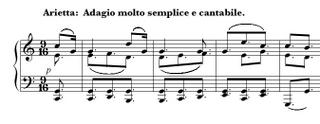What better morning than oatmeal, juice, coffee, whatever CDs strike my fancy, and a pile of books (Bellow, Baudelaire, Montaigne) on my bed, while the clouds gloom it up outside? And playing a phrase of Schubert over and over, for kicks, and running to the piano, trying to figure out the harmonies in Rufus Wainwright. I know these hours (the first, “most productive” hours of the day) are sinful idleness, an egghead’s Eden, and only marginally my profession; I know that my own pleasure is unreasonable but it exists. Afterwards I do not feel a stomachache as I do after nachos, popcorn, etc. How can I harvest my own positive energy at these times for the world’s greater good? I must be plugged in there somewhere.
I am very insecure about what I’m about to do: “prove” a puppy love. Today, and yesterday, and the day before, I am truly loving Memphis Skyline from Rufus Wainwright’s album, Want Two. I am worried this blog contains nothing but love letters to pieces whose right to be loved is already beyond dispute (though these pieces are, therefore, loved less than they deserve–like old friends taken for granted). So, let me stick my neck out into dangerous territory of which I know little. Will this bring me any “street cred”?
I want to be specific (even rational) about this affection, not just gesture at it. It has to do with these lines:
So kiss me my darling
Stay with me till morning
Not noteworthy, maybe even banal? In fact, 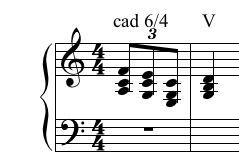
A deliberate, unassuming cliché. Where does it come from … ? Nowhere and everywhere. I wouldn’t even think about it, wouldn’t bother about it (in the same sense you wouldn’t analyze a comma), except that it seems to be a subject of contemplation in the song: the song ITSELF submits this cadence to analysis. It does this by toying with cadential possibilities. The example above is the “basic” version–ending in a root position V chord (G)–but Rufus colors it most of the time with the third below, E:
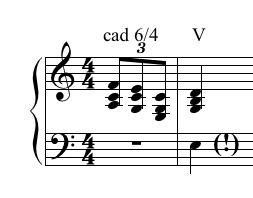
And some of the time he goes further, adding a more disturbing, questioning, intruding note (B-flat):
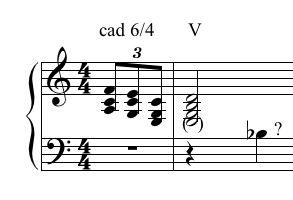
The E (voiced carefully down) simply makes the cadence somewhat “multivalent,” softens its too-classical tonality. But if this E is a “coloration” of the dominant, the B-flat feels more like a “contradiction.” In music theory terms, the B-flat heads us in the other (the wrong?) direction, back towards the subdominant …
So, Rufus is toying with options, with shadings of this cadence–and the music keeps coming back to this incomplete cadence, almost irritatingly. (No matter what). Again and again starting tonic, going to dominant; each phrase a question, never really answered. No corresponding, replying phrase: no “consequent.”
It is in this consequent-free context that my magical moment appears. Towards the end of Memphis Skyline, the piano is ruminating (obsessively) over this same cadence. We hear it three times in a row! (The cadence is now isolated, seprated from the phrase, understood as “the point”). The first two times, the E is present, the B-flat is played; an impasse; an unanswerable contradiction; let’s try again. But the third time, the piano plays a conventional V, a good old-fashioned V-7, actually… sounds almost hymnic, barbershop quartet? … perhaps it will simply resolve, finally, this cadence, this obsession?
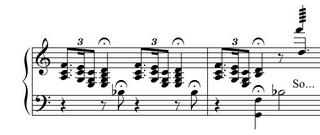
But Rufus, so close to the ground, seizes this opportunity to take off, to make a visit to an implication: the B-flat, that “contradiction.”
So, when this B-flat is heard a third time, it is not an accident, not a “wrong note” (though it has posed as one). Rufus, inspired by it, enters a third above this B-flat (“So … “), on a D; a high F tremolo is heard. Voila! A harmony: B-flat; D; F. Are we in “pure” B-flat major, is this what the B-flat has “meant” all this time?
Before answering that question, obliquely, another: If you were going to set those lines (“so kiss me my darling, stay with me till morning”), give them a melodic contour, would it be this?:

This is Rufus’ setting. (I have flattened out the rhythmic relationships to make a point). It seems like the setting of an idiot, someone with only three notes on his electronic keyboard. These (E, D, C) are “cadential” melodic notes … (Three Blind Mice, Lebewohl, Schenkerian 3-line) falling, relinquishing, and if only Rufus could settle on C, it could end, the tension could be resolved… but you can see that he keeps going over the three notes, reiterating the obvious. The texture explodes into shimmering, quiet, pulsing arpeggios. The whole purpose of this passage is to introduce a shifting cast of characters beneath these familiar notes (to think over the cadence!). Rufus visits upon these basic, relinquishing tones (E-D-C) a tremendous amount of expressive resistance. The melody’s desire to resolve (leave, depart, be finished, pass away) vs. the harmony’s desire to prolong? (“Stay with me till morning.”) And so each go-around has a different harmonic connotation… first D-C (“kiss me”):
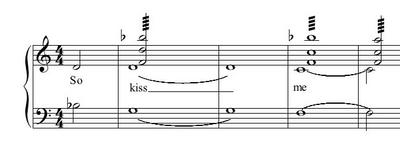
Then back through E-D-C with an especially long wait on the beautifully harmonized D:
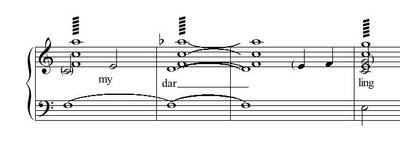
Then my favorite! He takes another spin through the 3 notes, with a fantastically unexpected bassline. Rufus must love this one too because the bass slides down from A to D, calling attention to itself. I always feel a little desire to jump around, to make some frenetic movement at this moment, because there is this supercharged static electricity for me here, some sense of repressed force:
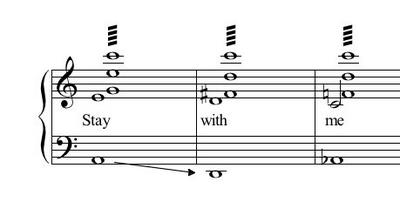
And one last, incomplete, version… E E D … (where’s my C?)…
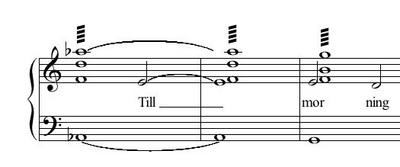
Don’t forget that that dominant cadence (from before we ever got into this beautiful mess) is still waiting to be resolved. Rufus has not forgotten. With that B-flat excursion, he merely wanted to make us forget; so we can be made to remember. He was written a purple patch. And on this last D (“-ning”) he seems to notice at once that the dominant’s time has come (though of course he has prepared it inexorably), and to want moreover to make the “simple dominant” as thrilling as all the rest has been. Wonderful, ranging scales in the bass, unexpected voicings, permutations of the dominant, the dominant is alive! And no simple ending either. At the moment of resolution, while the strings are still holding a suspension (C), a “wrong-note/right-note”, a muted trumpet enters with B. B and C blur against each other: another contradicted cadence.
I was on the phone with a good friend who told me, if I “ever ran into Rufus,” to tell him that the sucking, breathing sounds he makes between phrases in the live recordings are “very distracting.” Hopefully I will “run into” Rufus someday, if only to tell him how much I have enjoyed even just thinking about this one passage, but I will not pass on my friend’s advice. I sympathize with those sounds. If you have a simple melody note to sing, over complicated harmonies, there is a gap of meaning which you are dying to fill. I often take complicated breaths before simple notes at the piano, trying to put as much meaning into my little E or D or C as I can, as much as I feel is in there. It is never enough, and my moaning and gesturing and whatever body language I bring to the piano will never be enough either. But: the gap is thrilling. I am glad Rufus (someone out there!) is writing melody notes that have so much to yearn for, that are so incomplete. Listening to this acoustic desire, I wallow in my own desires and let them carry me to elation or melancholy, by turns. Isn’t that puppy love? QED.










